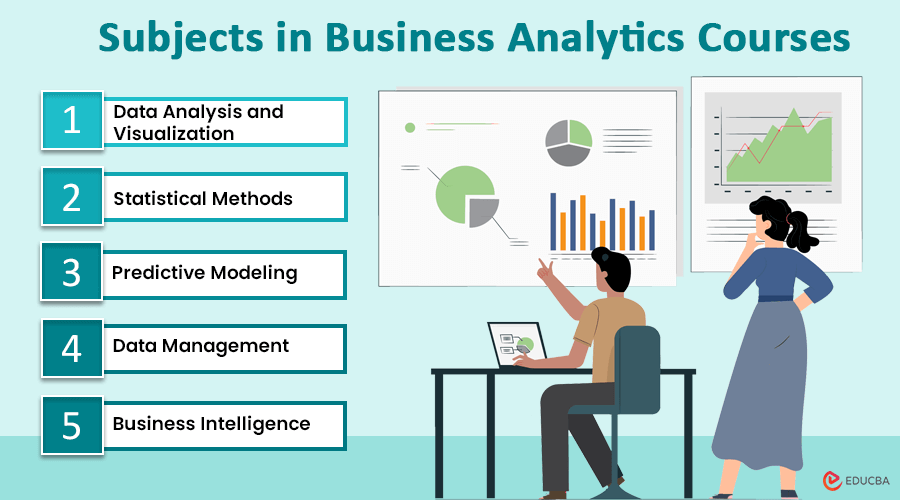Why Learn Subjects in Business Analytics Courses?
Business analytics have become essential in today’s business world, focusing on analyzing data to aid decision-making. The subjects in business analytics courses equip individuals with the skills to analyze data, understand the results, and apply changes. They combine theory and practical exercises, preparing learners to contribute to organizations.
Business analytics involves using methods like statistical analysis, data mining, and predictive models on business data. Its goal is to recommend strategies for better business outcomes. The field plays a key role in areas like marketing, finance, supply chain management, and human resources.
Crucial Subjects in Business Analytics Course
Here are some of the key subjects that you will find in a business analytics course:
#1. Data Analysis and Visualization
A major factor covered quite often in business analytics courses is data analysis and data visualization. It entails mastering ways and approaches to obtain, clean, and mine data to discover trends within them. Dashboard tools such as Tableau, Power BI, etc, help to interpret the data and present it in a manner that is easily understandable.
#2. Statistical Methods
Statistics is the foundation on which business analytics base their solution. There are usually two broad areas commonly taught in statistics classes: descriptive statistics and inferential statistics, which are used in summarizing data and making forecasts on sample data, respectively. There are also different kinds of probability distributions, hypothesis testing, and regression analysis that are more important to make proper interpretations of the data.
#3. Predictive Modeling
Another great component of business analytics is predictive modeling. It entails correlating past activity patterns through the help of statistical algorithms and machine learning to capture the trends that are likely to occur in the future. The courses also cover the training. Hence, courses provide learners with practical skills in predictive modeling tools and software to build reliable models for business forecasts.
#4. Data Management
Data management is an important component that determines the success rate of business analytics. Courses help students handle data, such as where and how to store and secure the data. It helps in the creation of data that is of high quality and retrievable for use in the analysis where the need arises.
#5. Business Intelligence
BI is intertwined with business analytics, as both of them are data analysis concepts that provide relevant organizations with important information. Business intelligence, on the other hand, entails the usage of information tools and business applications that enable information gathering and processing within a business organization. BI is a component of business analytics classes, where learners also gain knowledge regarding the procedure of converting data into valuable business information.
#6. Technological Proficiency
In addition to knowledge in the specific topic area, specific analytical tools and software knowledge are crucial for BA professions. Classes focus on the technologies as they may encompass Excel, SQL, R, Python, and other specific analytical tools. Recognition of these tools enables an individual to manage the vast amount of data for analysis.
#7. Practical Applications
Business analytics courses focus more on the implementation part of the course to ensure the incorporation of the theories learned. These are cases, examples, and projects, and the internship offers the learners the experience of working on the business concepts they learn in class. Exemplar types promote understanding as much as they provide real-life situations that students can relate to when working with data.
Career Opportunities
The courses on business analytics profession are growing as the need and importance of skilled business analysts in different organizations become more important today. The option of getting a business analytics course can provide lots of career opportunities if you graduate. Examples of personas are data analyst, business intelligence analyst, data scientist, and analytics consultant. The contents of these courses are also easily applied in any setting, so the skills earned in these classes are relevant in any given business environment.
Final Thoughts
Business analytics courses are necessary for those who want to tap into the power of data to shape business decisions. They offer an enlarged view of the analysis of data, the methods of their calculations, the processes in predicting models, and data management. Such courses help students to learn the practical applications of business and ensure that they become efficient in the use of technology to operate successfully in the business world. Those educational programs aiming at preparing business analytics specialists respond to the evident demand for preparing individuals with skills and tools that can support business outcomes.
Recommended Articles
We hope you excel in these subjects in business analytics courses and become a successful business analyst. Here are other resources you can view.




